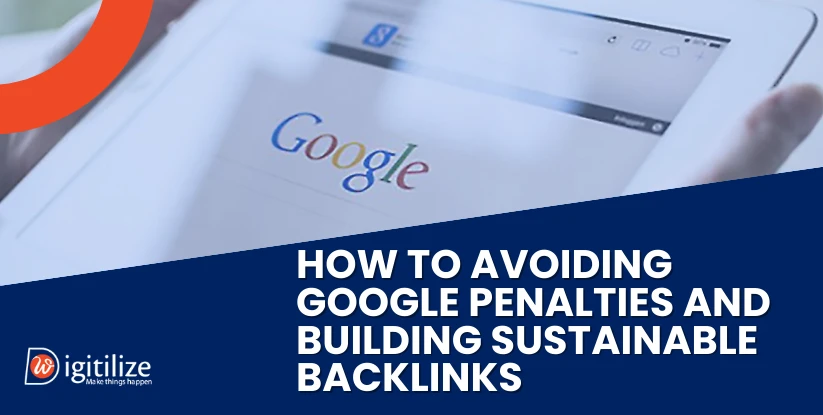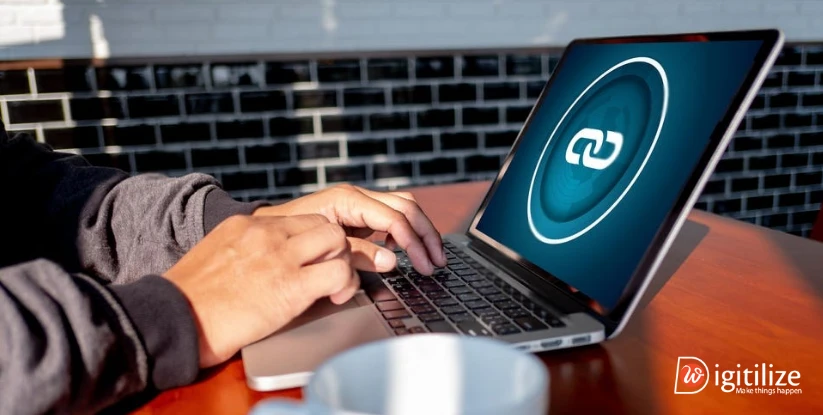How to Avoiding Google Penalties and Building Sustainable Backlinks

The Internet marketing industry is a dynamic and continuously changing field, meaning that maintaining a strong online presence is crucial given the high stakes involved. Examine how to avoiding Google penalties and SEO strategies in the UK and protect your digital platform.
Search engine optimisation, or SEO, is the cornerstone of this project. You can fix a Google penalty, but avoiding it is much better. In this post, we focus on proactive SEO techniques that keep your website safe from Google penalties. DigitilizeWeb, a trusted name in SEO, will guide you through this proactive approach.
Type of Google penalties
Algorithmic penalties and manual punishments are the two main types of Google penalties. Let’s now decode each of them individually.-
Manual Procedures
This issue hurts search results because useful queries get buried under many irrelevant ones. Since its start, Google fights spammers to improve the search experience for users.
The Google webspam team regularly checks websites to see if they follow Google’s webmaster quality guidelines. If a website breaks the rules, the webspam team can manually block it. Google notifies the website owner about this action through the Google Search Console.
When a Google employee reviews your website and finds it breaks certain rules, they can flag it for removal from Google search results. This action is called a manual penalty.
-
Algorithmic Penalties
Google’s complex algorithmic penalties in UK SEO help pick the most relevant data from its search index. This ensures users get the best results for their queries.
Google often changes its algorithms to improve search quality and user experience. These sudden updates make it harder for digital marketing compliance UK teams and website owners to keep up. Google SEO penalties UK often hit websites or landing pages that don’t follow the latest algorithm rules.
Recognising Penalties for Backlinks

Backlinks play a crucial role in SEO. But if you build them the wrong way, search engines can penalize your website. When they spot dishonest or manipulative link-building tactics, they may lower your rankings or even remove your site from search results.
To avoid penalties, focus on creating relevant, high-quality backlinks from reliable websites. Avoid too many link exchanges and use different anchor texts for your links. Regularly check your backlink profile and remove any suspicious or low-quality links.
Search engine results rely heavily on backlinks. If you have spammy or low-quality links, search engines may penalize your website. These penalties can lower your rankings or even remove your site from search results. To avoid this, check your link profile often. Remove or disavow any harmful or irrelevant links quickly.
Building relevant, high-quality backlinks from trusted sources boosts your website’s exposure and authority. A strong backlink profile plays a key role in long-term success with organic search. Focus on maintaining a healthy link profile to improve your website development company’s online presence.
Ways To Avoiding Google Penalties
-
Recognising Toxic or Low-Quality Backlinks
-
Make a Link Audit
-
Concentrate on Developing High-Grade Backlinks
Ask influential people in your field to link to your website. Focus on getting high-quality backlinks, not many low-quality ones. Quality backlinks help your site rank better and attract the right audience. Few high-quality backlinks for UK businesses are preferable to a large number of low-quality ones.
-
Producing Useful Content to Gain Organic Backlinks

Are you aware that 94% of updated information on the internet never receives a backlink? A good strategy to organically draw in high-quality backlinks is to provide creative, insightful, and new content. By consistently creating valuable content, a brand gains recognition in its industry. Other websites looking to share useful material will link to it naturally. This process helps avoid Google penalties. It also builds sustainable backlinks that last.
To get high-quality backlinks to your content, you need to promote it actively. Reach out to bloggers directly. Use email marketing to connect with your audience. Share your published material on social media channels. When you promote high-quality content strategically, you increase website traffic. This approach also boosts your backlink development efforts effectively.
-
Examining Rival Backlinks to Find Opportunities for Link-Building
Tools for backlink analysis help you discover the link-building tactics your rivals use. They also show you new opportunities for your website. Using these tools can help you avoid Google penalties and build sustainable backlinks.
These tools examine your competitors’ backlink profiles in detail. They look at the number and quality of backlinks and the types of websites linking to them. You can then contact those websites to get similar backlinks for your site. This approach can boost your website’s search engine rankings and bring in more relevant visitors.
-
Website Hack
-
Preventing Over-Optimisation of the Heading
Avoid over-optimising anchor text to prevent penalties for backlinks. Use a varied and natural mix of keywords when creating anchor text. Search engines may flag or penalize sites that use exact match anchor text too often. Instead, use a combination of branded, generic, and long-tail anchor texts. This approach helps you avoid Google penalties and build sustainable backlinks.
Try using synonyms or similar phrases instead of repeating the same keyword in every anchor text. This way, you boost your website’s SEO without risking penalties and maintain a balanced anchor text profile.
-
Security Concerns and Malware
Tips For Building Sustainable Backlinks

-
Keep an Eye on and Examine Your Backlinks Frequently
-
Recognising and Handling Any Concerns
If many backlinks use the same anchor text, it can look manipulative. To manage this, regularly check your backlink profile using tools like Google Search Console. Disavow any links that seem suspicious or unusual. Doing this helps you fix potential red flags. As a result, search engines will keep viewing your website positively.
-
Using Resources to Look Up Fresh Backlinks
To maintain your backlink profile well, use tools to find fresh backlinks regularly. These tools help you spot shady or low-quality backlinks that might harm your website’s SEO. SEO experts in the UK often recommend checking your backlinks with tools like Ahrefs, Moz, and SEMrush.
This information helps you judge the relevancy and quality of every backlink. You can then decide if you should ask to remove a bad link or disavow it. By staying alert and using these tools wisely, you reduce the risk of Google penalties. This approach keeps your backlink profile strong and sustainable.
-
Enhancing User Experience and Website Structure
To avoid backlink penalties, optimise your website’s user experience and structure. A clear website lets search engines crawl and index your content quickly. Create simple navigation that users can follow easily. Use descriptive URLs and group pages in a logical way. Good user experience lowers bounce rates and keeps visitors engaged. Focus on fast loading times, clean designs, and mobile-friendly layouts.
This post shares practical tips for maintaining a balanced link profile and avoiding backlink penalties. When building backlinks, always choose quality over quantity. Perform regular link audits to find and remove harmful or low-quality links.
It also emphasises the importance of using a variety of anchor text and offers tips on how to create relationships with other respectable websites and provide UK-based SEO content strategy that will naturally draw in high-quality backlinks. For more follow us on LinkedIn.

